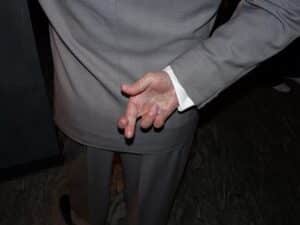How Can The Court Determine Who Is Telling The Truth About An Accident Or A Personal Injury?
It comes as somewhat of a surprise to many individuals- especially those who are facing the daunting prospects of litigation for the first time– that simply getting on the stand and telling your story may simply not be enough to carry the day in court.

While it may not necessarily come as a surprise that the other participants in the accident might have a different story or version of events, some people are shocked that a judge or a jury might find that other version of events to be more credible, more believable, and in fact, adopt it as the version of what happened. Make no mistake about it: there are clearly cases where one party is telling the truth and another party is fabricating all or part of a story. Although there are no statistics on this, my sense has always been that rather than one-party telling the truth and one party lying, divergent testimony in personal injury cases is likely most often a question of perspective.
Both participants in the typical automobile accident have experienced and perceived the same event, albeit just from a different perspective, point of view, position or angle.
They may very well legitimately and in good faith remember a sequence of events that differs, slightly or largely, from the other side’s good faith recollection of events. My impression is that these differences are most often explained not by deliberate lies, but by operation of perception and perspective. Nevertheless, individuals are shocked and dismayed when a judge or a jury adopts the other party’s version of how an event occurred rather than their own. I Attorney Eric T. Kirk once heard a litigant, whose claim was denied by a judge on credibility grounds, state with no small degree of surprise and a large measure of incredulity: “I think that judge was saying that I was lying”. That was indeed exactly what the judge was saying.
Certainly, judges don’t have an ability to “see through” the facts, the evidence, and the testimony, in order to divine what “really happened”.
Rather judges and juries must weigh competing stories about an accident and determine what is most consistent with their common experiences, the evidence they see in front of them, and their common sense. Having said that, there are most certainly instances where someone is testimony is not credible or not worthy of belief. Juries, in fact, are instructed on a number of factors that they may consider in determining whether someone may or may not be telling the truth.
- motive, interest and bias
- prior inconsistent statements
- behavior on the stand and manner of testifying;
- opportunity to see or hear the event
- the consistency of the witness’ memory when weighed against other known variables
Even if it’s not a question that boils down to “is a truth or this is a fabrication” these factors have been found to assist jurors in determining whether or not somebody’s testimony – actually believed by the one telling it- is, in fact, worthy of the belief of others. Determining who to believe and who to disbelieve is one of the most basic, sacred duties and time-honored functions of a juror. In a bench trial, the judge assumes this role.



